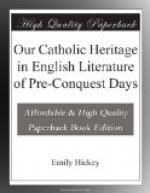In our gratitude to Alfred, we must not forget our gratitude to the English scholars of older days, none of whom had put us under so great a debt as our dear old Benedictine of Jarrow.
A later writer than St Bede, though not so great as he, was Alcuin of York, who was invited by no less a man than Charlemagne to teach his children, and who became, as it has been phrased, a sort of Minister of Public Education in his empire.
Alcuin was good as well as great, and I will give you a little instance of the rightness of his thought. In a Dialogue which he wrote, in his teaching days, he supposes Prince Pepin to ask the question, “What is the liberty of man?” and the answer is, “Innocence.”
But the evil days of invasion and war and trouble had swept learning from its northern home; and Alfred’s work was to bring it back to another part of England.
CHAPTER VI
Decay of learning in England. Revival under Alfred. His translations. Edits English Chronicle. His helpers. Some of his sayings. Missionary spirit. “Alfred commanded to make me.”
We cannot forget the impression that must have been made upon Alfred by his stay in Rome, young as he was at the time, he being in the centre of royal state while there, and also being himself a royal child to whom much would be told and under whose notice much would be brought; and who, from his position, would be expected to mark and remember much. Long afterwards, he would recall the magnificence he had seen, and associate it with the glories of the double history of Rome; Rome pagan and Rome Christian: Rome, the great conqueror and law-giver, spiritual as well as temporal. Very often, after Alfred was king, he sent over embassies and gifts to Rome, loving her, and reverencing her as it was meet he should. The Holy Father granted him certain privileges for the English school at Rome, and sent him a piece of the wood of the Holy Cross.
There is a pretty story told of Alfred’s early learning to read English verse. Even if it is not true, it points to his love of English, as well as learning; a love which never left him. He wanted English to be taught in schools, and he loved the old poems. We owe to him the translation of the account of the first English poet, Caedmon, from which I have quoted in my first chapter. But rightly, he felt the very great importance of learning Latin, and so he learned it himself, and made others learn it too.
When Alfred came to the throne, he tells us, learning had fallen away so utterly in England that there were very few of the clergy, on the south side of the Humber, who could understand the Latin of their Mass-books, and he thinks not many beyond the Humber. This state of things was very different from that of old times when the clergy were “so keen about both teaching and learning and all the services they owed to God”: very different from St Bede’s time, and the days when Northumbria was a centre of learning and culture. Alfred was to create a new centre, not in the North but in Wessex. Later on, the centre of learning and cultivation was shifted to the East Midlands, whose dialect became the language of England, and whose great poet, Chaucer, was the greatest English poet before Spenser and Shakespere.




